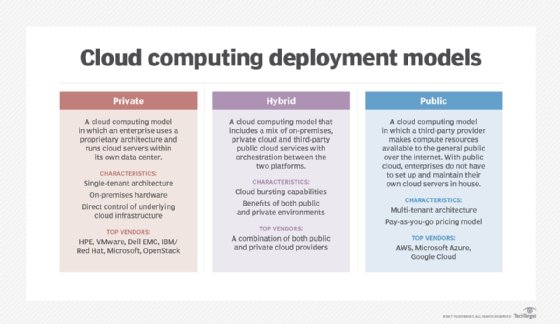cloud storage service
What is a cloud storage service?
A cloud storage service is a business that maintains and manages its customers' data and makes that data accessible over a network, usually the internet.
Most of these types of services are based on a utility storage model. They tend to offer flexible, pay-as-you-go pricing and scalability. Cloud storage providers also provide for unlimited growth and the ability to increase and decrease storage capacity on demand.
Leading uses for a cloud storage service include backup, disaster recovery (DR), collaboration and file sharing, archiving, primary data storage and near-line storage.
Public vs. private vs. hybrid services
Public cloud storage is a service owned and operated by a provider. It is usually suitable for unstructured data that is not subject to constant change. The infrastructure usually consists of inexpensive storage nodes attached to commodity drives. Data is stored on multiple nodes for redundancy and accessed through internet protocols, typically representational state transfer (REST).
Designed for use by many clients, a public cloud storage service supports massive multi-tenancy with data isolation, access and security for each customer. It is generally used for purposes ranging from static noncore application data to archived content that must still be available for DR and backup.
Vendors generally charge on a dollar- or cents-per-gigabyte-per-month basis. There might be added fees for data transferred and access charges. Amazon, Microsoft and Google are the three largest public cloud storage providers. Other examples of public cloud service providers are Apple, Box, Dropbox, IBM and Rackspace.

Private cloud storage services address the data safety and performance concerns of public cloud storage by bringing cloud storage inside an organization. A private cloud storage service is more suitable for actively used data and data that an organization needs more control over.
Here, storage is on a dedicated infrastructure within the data center, which helps ensure security and performance. One example of a private cloud storage offering is the Hitachi Enterprise Cloud.
Some enterprise users opt for a hybrid cloud storage model that stores unstructured data -- for backup and archiving purposes, for example -- and less sensitive data with a public cloud provider. At the same time, a private cloud stores active, structured and more sensitive data.
Consider the following about any cloud storage service:
- Does the service use REST, the most common cloud storage API?
- Are you migrating data from an existing archival storage product?
- Does your data have to be preserved in some specific format to meet compliance requirements?
- Can the provider deal with large fluctuations in resource demands?
- Does the provider offer both public and private clouds? This might become important if you want to migrate data from one type of service to the other.
Cloud storage pros/cons
Advantages of private cloud storage include high reliability and security. But this approach to cloud storage provides limited scalability and requires on-site resources and maintenance.
Public cloud storage offers high scalability and a pay-as-you-go model with no need for an on-premises storage infrastructure. However, performance and security measures can vary by service provider. In addition, reliability depends on service provider availability and internet connectivity.
Hybrid cloud storage offers the best of the private and public cloud with high scalability and on-premises integration that adds more layers of security. The result is better performance and reliability because active content is cached locally. While a hybrid cloud tends to be more costly than public storage, it is cheaper than private cloud storage. Reliability can be an issue, as users must depend on service provider availability and internet connectivity.
Recovery and performance
Select storage type with care. Choose a storage service that delivers the amount of performance and resilience most suitable for your workload at the least possible cost.
Gauge availability and performance. Metrics enable users to monitor and measure when a public cloud storage service performs as it should or has issues. Having access to these metrics eases troubleshooting and facilitates improvements to architectures and workload designs.
Adapt to the behaviors of the cloud storage service. The way a cloud storage provider stores and provides access to data cannot be changed by customers to address unexpected variations in performance because they share the infrastructure with many other organizations.
Clients do have the ability to redesign the architecture of their workloads by duplicating storage resources in more than one public cloud region, for example. This way, cloud storage customers can redirect storage resources to the replicated region should problems arise. Caching can also address -- and head off -- potential cloud storage service performance issues.
Consider the hybrid approach. Deploy dedicated tools to accelerate connectivity between your on-premises data center and cloud storage when local workloads can't surmount the performance limitations of a public cloud storage service.
Improve connectivity. Sometimes, performance issues are caused by shortcomings in the internet connection itself due to unexpected disruption and congestion -- always a risk when using the public internet.
Cloud storage and data migration
Migrating data from one cloud storage service to another is an often-overlooked area. Cloud migrations have become more common due to market consolidation and price competition.
Businesses tend to switch cloud storage providers either because of price -- which must be substantially cheaper to justify the cost and work of switching -- or when a cloud provider goes out of business or stops providing storage services. With public cloud providers, it is usually just as easy to copy data out of the cloud as it was to upload data to it. Available bandwidth can become a major issue, however. In addition, many providers charge extra to download data.
To mitigate concerns about a provider going out of business, you could copy data to more than one cloud storage service. While this increases cloud storage costs, it is often still cheaper than maintaining data locally.
Should that not be the case, or if bandwidth becomes a major sticking point, find out if the original and the new cloud storage service have a direct-connect relationship. This approach also removes the need of cloud storage customers to use their data centers as a bridge or go-between -- such as using an on-premises cache -- to facilitate the transfer of data between the two cloud storage providers.
Editor's note: This article was revised in 2023 by TechTarget editors to improve the reader experience.







